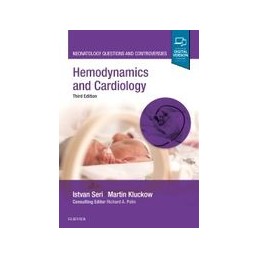- Obniżka


 Dostawa
Dostawa
Wybierz Paczkomat Inpost, Orlen Paczkę, DHL, DPD, Pocztę, email (dla ebooków). Kliknij po więcej
 Płatność
Płatność
Zapłać szybkim przelewem, kartą płatniczą lub za pobraniem. Kliknij po więcej szczegółów
 Zwroty
Zwroty
Jeżeli jesteś konsumentem możesz zwrócić towar w ciągu 14 dni*. Kliknij po więcej szczegółów
Opis
SECTION A. DEVELOPMENTAL CARDIOVASCULAR PHYSIOLOGY AND PATHOPHYSIOLOGY
1.Principles Of Developmental Cardiovascular Physiology And Pathophysiology
2. Vascular Regulation Of Blood Flow To Organs In The Preterm And Term Neonate
3. Definition Of Normal Blood Pressure Range: The Elusive Target
SECTION B. HEMODYNAMIC PRINCIPLES OF POSTNATAL TRANSITION
4. Cardiorespiratory Effects Of Delayed Cord Clamping
5. Hemodynamic Significance And Clinical Relevance Of Delayed Cord Clamping And Cord Milking
6. Transitional Hemodynamics And Pathophysiology Of P/Ivh
7. The Immature Autonomic Nervous System, Hemodynamic Regulation, And Brain Injury In The Preterm Neonate
8. Pathophysiology Of Pphn: Cellular Basis And Animal Studies
9. Pathophysiology-Based Treatment Of Pphn -
SECTION C. DIAGNOSIS OF NEONATAL CARDIOVASCULAR COMPROMISE: METHODS AND THEIR CLINICAL APPLICATIONS
Sub-Section C1 Assessment Of Systemic Blood Flow And Cardiac Function: Ultrasound
10. Point Of Care Ultrasound In The Assessment Of The Neonatal Cardiovascular System
11. Assessment Of Systemic Blood Flow And Myocardial Function In The Neonatal Period Using Ultrasound
12. Tissue Doppler Imaging
13. Speckle Doppler Tracking
Sub-Section C2 Assessment Of Systemic Blood Flow And Cardiac Function: Other Methods
14. Assessment Of Cardiac Output In Neonates: Techniques Using The Fick Principle, Indicator Dilution Technology, Doppler Ultrasound, Thoracic Electrical Impedance And Arterial Pulse Contour Analysis
15. Cardiac MRI In The Assessment Of Systemic And Organ Blood Flow And The Function Of The Developing Heart
16. Methods To Assess Systemic And Organ Blood Flow In The Neonate: Principles
Sub-Section C3 Assessment Of Organ And Peripheral Blood Flow
17. Near-Infrared Spectroscopy
18. Clinical Applications Of Near-Infrared Spectroscopy In Neonates
19. Assessment Of The Microcirculation In The Neonate
Sub-Section C4 Comprehensive And Predictive Monitoring
20 Heart Rate And Cardiorespiratory Analysis For Sepsis And Nec Prediction
21. Comprehensive, Real-Time Hemodynamic Monitoring And Data Acquisition: An Essential Component Of The Development Of Individualized Neonatal Intensive Care
SECTION D. CLINICAL PRESENTATIONS AND TREATMENT OF CARDIOVASCULAR COMPROMISE IN THE NEONATE
Sub-Section D1 Patent Ductus Arteriosus
22. Diagnosis, Evaluation And Monitoring Of Pda In The Very Preterm Infant
23. Pharmacologic Management Of Pda In The Very Preterm Neonate
24. Surgical Management Of Pda In The Very Preterm Infant And Post Ligation Cardiac Compromise
25. Pathophysiology Based Management Of The Hemodynamically Significant Ductus Arteriosus In The Very Preterm Neonate
26. Cardiovascular Compromise In The Preterm Infant During The First Postnatal Day
Sub-Section D2 Pathophysiology And Treatment Of Neonatal Shock
27. Assessment And Management Of Septic Shock & Hypovolaemia
28. Hemodynamics In The Asphyxiated Neonate And Effects Of Therapeutic Hypothermia
29. Pathopysiologically Based Management Of Circulatory Compromise
30. The Neonate With Relative Adrenal Insufficiency And Vasopressor Resistance
SECTION E. CARDIOLOGY
31. Neonates With Complex Congenital Heart Disease: Delivery Room Management And Stabilization Before Transfer To The Cardiac Icu
32. Catheter-Based Therapy In The Neonate With Congenital Heart Disease
